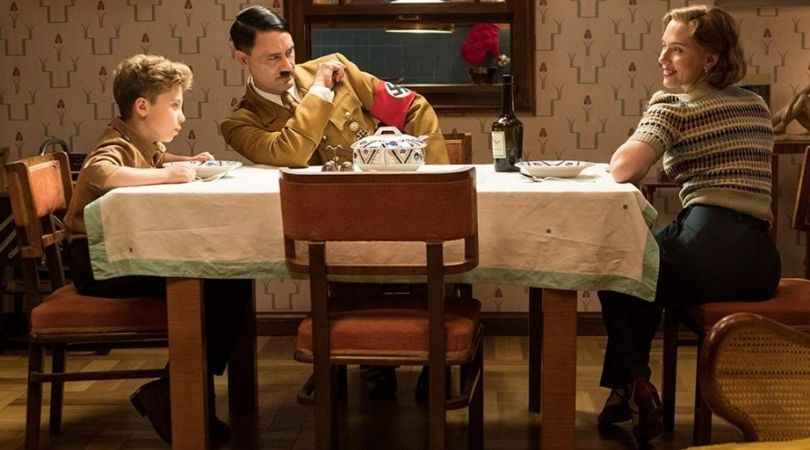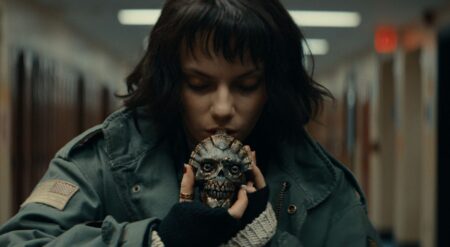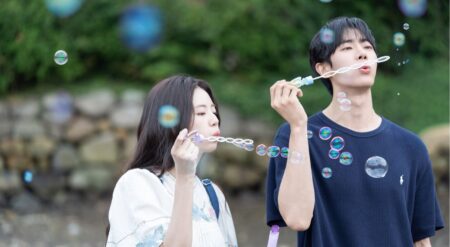
Jojo Rabbit, Taika Waititi‘s latest film, offered up an anti-hate satire as the festival opener at Fantastic Fest 2019. A World War II film with comedic bite, Jojo Rabbit is the story of an awkward 10-year old boy, Jojo (Roman Griffin Davis), whose only ally is his imaginary friend Hitler (Taika Waititi). A kid in the Nazi youth program with aspirations of becoming one of Hitler’s personal guard, his naïve patriotism is tested when he meets the young Jewish girl named Elsa (Thomasin McKenzie), who his mother has offered safety to. What follows is a satire that leans into absurdity while offering up a strong emotional narrative. As the jokes pull you in, the darkness hits your heart and you remember the reality of the time.
While at Fantastic Fest, Waititi offered up commentary to his work in both a Q&A following the film and during his red carpet time. “Comedy should be more than smoking a bong and talking,” said writer, director, and actor Waititi when asked about how he balanced the emotion of World War II and the satire that gave the audience belly laughs. For him, comedy is a tool that does more to explore the dark and to teach from it. Because of this, Jojo Rabbit isn’t just a comedy.
For Waititi it’s a WWII film that just so happens to point out the absurdity of the Third Reich and deal with grim reality. The son of a Russian Jewish woman who escaped persecution and a Maori man, Taika’s background positions him to bring a story that forces its audience to look at atrocity while lining the bitter pull with laughs to make it go down easier. Having begun Jojo Rabbit in 2011, Waititi remarked that as he waited to finish the film, it only became more relevant, and that apparently some people still need to be told that Nazis are bad. With that being said, the message is delivered in a way that uses Doctor Strangelove and The Great Dictator to tell the story rather dive into the dramas that saturate the WWII subgenre.
But even though WWII films continually dominate award shows and keep being made, Waititi explained that we keep forgetting the atrocities committed during the war and that the youngest of us, the children are most in danger of that. While explaining the purpose of the film as a satire he said, “I didn’t think it’d be very good as a straight drama. And I wouldn’t want to do it as a straight comedy, because that’s inappropriate. So I feel like, in telling these stories again and again, because we have to — and it seems kind of weird that we are forgetting, so it’s important that we keep telling these stories, again and again, but re-tell [them] in interesting new ways.”
For Waititi, the new and interesting way was by presenting WWII and the Holocaust through the eyes of a 10-year old boy named Jojo. By choosing to center the events through the mind of a child, Waititi is able to showcase the absurdity and falsehoods that built the Riech. This is done no better than through his portrayal of Hitler. When asked about how he prepared for the role, he responded that he didn’t. Explaining that, “he’s conjured from the mind of a 10-year-old who knows nothing about the world…He had to know nothing, be an idiot — more of an idiot than he was.” But beyond that, Waititi didn’t want to give any honor to the man he played, because ultimately, he doesn’t deserve it.
The explicit irreverence throughout the film keeps the audience laughing while also ensuring that this isn’t a movie about a “good Nazi,” making the distinction between the adults who use their agency to act on dangerous and hateful beliefs and the children who enter those beliefs because of the world around them. Jojo Rabbit uses satire in a balanced way. Waititi’s irreverence is focused on those who don’t deserve historical accuracy nor respect, the Nazis, while he handles the experiences of fighting against, or in Elsa’s case just surviving against them, with emotion and a delicate hand of humor that uses the perspective of a child without removing the weight of history.
There is an intimacy in the scenes between Elsa and Jojo. The emotional weight of them showcases their ages, their circumstances, their innocence, and their perceptions about each other. As Jojo begins to write an expose about Jewish people, he asks for Elsa’s help. While Elsa plays with his racist ideas of her she also begins to change them. Waititi’s ability to play with stereotypes while also using Jewish history and myth to show Elsa’s pride in her identity is not only well-crafted but much needed.
In addition to their time together, Jojo’s relationship with his mother (Scarlett Johansson), is also beautiful and heartbreaking. As a mother doing what she can to raise her son but also help fight the Nazis, she struggles with his identity and zealous celebration of Hitler. Her son is gone, present only in glimpses and instead, a Nazi is in his place. But she tries to help him see what the party he desperately wants to fight for has done to the world. Because of this, Jojo’s transformation through the story is one grounded in emotion and love but triggered by the violence and death around him.
While Waititi’s writing, direction, and acting shine in Jojo Rabbit, it’s the young stars of the film that carry it to great heights. For Waititi, the joy of the film came from working with the young stars, like Davis, because “kids don’t act.” For the director, the problem with adult actors is that they focus on the costume and the accent while the kids just bring the characters to life. And Davis does this as Jojo. His confusion, vulnerability, and misguided behavior all feel real. That said it’s McKenzie as Elsa who steals the show.
Elsa is a character whose power is felt even through her vulnerability. Even when the world is shouting at her to be ashamed of her identity, she remains unwavering in her confidence when pushed by Jojo. She is not weak, she is from a people who kill giants, and it’s through her dialogue that Waititi has crafted an immense strength in the face of unbelievable cruelty. But she is still a young girl who has lost her connections to the world and in McKenzie’s performance, you feel every bit the power and the sadness.
Jojo Rabbit is a beautiful film that uses absurdity to make you face history. It also carries significant emotional weight by showing the violent state of the time. This isn’t just a WWII movie with some jokes, it’s a powerful commentary on hate, our history, and the world around us that has not changed as much as we would like to think.
Jojo Rabbit is available now on VOD.
Jojo Rabbit
-
Rating - 9/109/10
TL;DR
Jojo Rabbit is a beautiful film that uses absurdity to make you face history. It also carries significant emotional weight by showing the violent state of the time. This isn’t just a WWII movie with some jokes, it’s a powerful commentary on hate, our history, and the world around us that has not changed as much as we would like to think.






